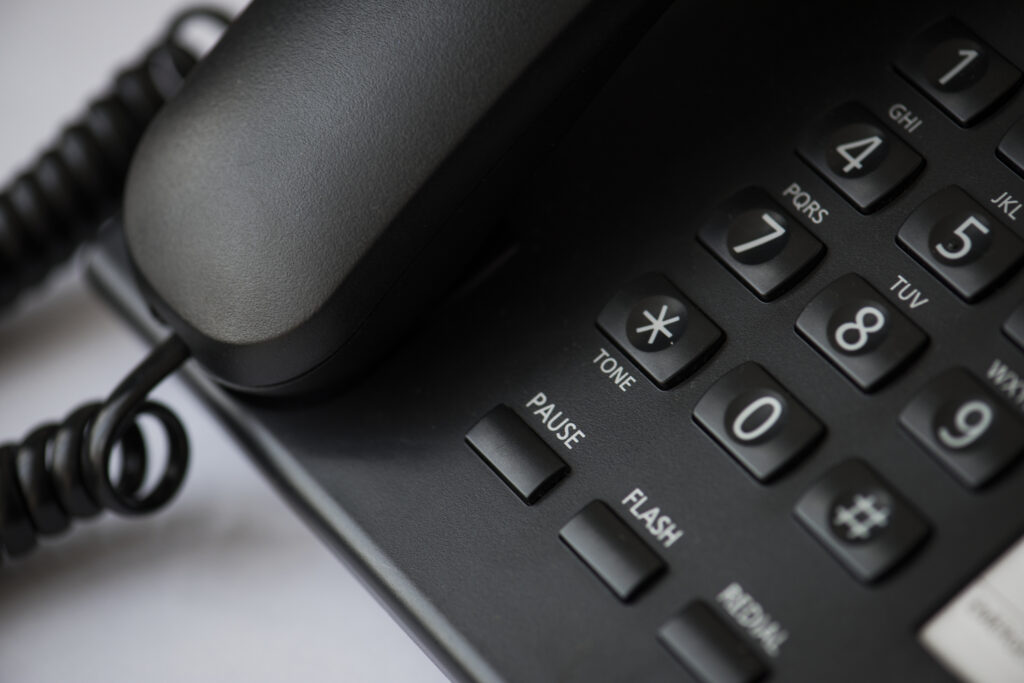The BT switch off: What it means and how to prepare
The BT switch off is one of the biggest changes the UK telephone network has seen in decades.
By January 2027, all traditional phone services that run on the PSTN and ISDN networks will be shut down. This means that millions of landlines, phone lines, and related services will stop working unless they are upgraded to digital alternatives.
If your business still relies on traditional landline services, the time to start planning is now.
At B4BC, we are here to guide you through this transition. We’ll explain why the switch is happening, what it means for your phone services, and the next steps you should take to make sure your business stays connected well into the future.
What is the BT switch off?
The BT switch off is the nationwide retirement of the UK’s old analogue telephone systems. It means that the Public Switched Telephone Network (PSTN) and ISDN will be permanently closed and replaced by a modern digital network that uses internet protocol (IP) technology.

This process is sometimes called the BT copper switch off or the BT analogue switch off because it involves removing the traditional copper lines that have carried voice calls for decades.
By the end of January 2027, BT Openreach, the division responsible for the UK’s landline infrastructure, will switch off all PSTN and ISDN services across the country.
This will bring an end to the traditional phone network that so many businesses and households still rely on.
Why is the BT switch off happening?
The BT switch off is happening because the UK’s traditional phone lines can no longer keep up with modern demands. The copper-based PSTN network is over a century old and was designed for a time when landlines were the only form of voice communication.
Maintaining this analogue network has become expensive and inefficient. Faults are harder to fix, fewer engineers are trained on legacy systems, and the infrastructure struggles to support the scale of today’s phone services and broadband needs.

By shutting down the PSTN and ISDN, BT Openreach is making space for a new digital network that runs on internet protocol (IP) technology.
This shift allows all voice calls, landline services, and related communications to be delivered over digital phone lines using VoIP and broadband connections.
Who will be affected by the BT switch off?
The BT switch off impacts more than just traditional phone lines. It will affect a wide range of customers and organisations across the UK, including:
- Small and medium-sized businesses that still rely on traditional landline services, PSTN network connections, or ISDN telephone systems.
- Larger organisations with multiple sites that need to coordinate migration of legacy communications and broadband services.
- Facilities managers responsible for alarms, CCTV, EPOS, or door entry systems that use analogue phone lines.
- Residential customers who still depend on landlines for voice calls or essential home services.
- Vulnerable users and carers who rely on telecare or safety alarms that currently run on the traditional phone network.
- Any business customers using fax, card machines, or older technology that connects through PSTN and ISDN lines.
What services will be affected?
The BT switch off is more than just the end of landline phones. Any service that relies on the old PSTN and ISDN networks will be impacted. Businesses and households need to audit their setup to make sure nothing gets left behind.
Landlines and phone lines
Traditional landline services that run on analogue copper lines will no longer work. This includes home landlines and business phone lines. Customers will need to move to digital phone line solutions such as VoIP or IP telephony.
Broadband services
ADSL broadband connections that use copper lines will be withdrawn. To continue using internet services, businesses and households will need to upgrade to fibre-based broadband options that can support digital voice services and VoIP systems.
Alarm systems and telecare
Burglar alarms, fire alarms, and telecare devices often use PSTN lines to send signals. These will stop working unless upgraded to digital alternatives. Providers are offering solutions for vulnerable users to ensure safety is not compromised.
EPOS and payment systems
Many card machines and EPOS terminals still use analogue lines to process transactions. These will need to be upgraded or replaced with IP-based or mobile payment systems that work over a secure broadband connection.
Fax and CCTV
Fax machines and older CCTV systems that depend on the PSTN network will also be affected. Businesses should plan to replace these with digital services that integrate with cloud platforms or broadband connections.
Key dates and milestones for the BT switch off
The BT switch off is being rolled out in stages. While the final deadline is set for 2027, important changes have already begun. Here are the key dates you need to know:
| Date / Milestone | What it means |
| September 2023 | Stop-sell of new PSTN and ISDN services began. No new analogue phone lines or ISDN services can be ordered. Existing services can remain active until the full switch off. |
| 2025 (recommended deadline) | Businesses are encouraged to complete their migration by the end of 2025. Waiting longer risks disruption as the traditional phone network is phased out. This is often referred to as the BT 2025 switch off. |
| January 31, 2027 | The official date of the BT 2027 switch off. All PSTN and ISDN services will be permanently shut down, including traditional landline phones, alarms, EPOS, fax machines, and other analogue services. |
| Delay from 2025 | The final deadline was extended from December 2025 to January 2027 to give businesses and customers more time to prepare. Despite the delay, it is strongly advised not to wait until the last minute. |
What are your options after the BT switch off?
Once the PSTN and ISDN networks are retired, every business and household will need to move to digital alternatives. The good news is that these digital solutions are more reliable, flexible, and feature rich than traditional landline services.

Digital phone lines
Switching to a digital phone line means your voice calls run over your internet connection rather than analogue copper. This option is simple, cost effective, and a direct replacement for traditional phone services.
VoIP systems
Voice over Internet Protocol (VoIP) systems give you far more than just calls. With features like voicemail-to-email, call routing, and mobile apps, VoIP services are ideal for small businesses that want modern communications without expensive equipment.
Did you know? B4BC’s VoIP systems are built with small businesses in mind. We’ll set you up with smart features like voicemail-to-email, call routing, and mobile apps, all without the need for costly hardware. It’s modern, flexible, and designed to grow with your business.
Cloud telephony
Cloud telephony is perfect for businesses that need scalability and flexibility. Hosted in the cloud, it allows your team to make and receive calls anywhere with an internet connection. It also integrates with digital services such as CRM systems and collaboration tools.
Broadband upgrade
To make the most of digital voice services, you may need to upgrade your broadband connection. Fibre broadband options ensure crystal-clear call quality and support advanced IP technology features.
How B4BC can help. At B4BC, we provide a full suite of digital voice services, from VoIP systems and cloud telephony to reliable broadband services. Our UK-based team will assess your current setup, recommend the right digital solutions, and handle the entire transition so your business is ready for the future.

Benefits of the BT switch off
The BT switch off may feel disruptive, but it comes with major advantages for businesses and residential customers. Moving away from traditional landline services opens the door to new features, better reliability, and cost savings. Here are the key benefits:
- Improved call quality. Digital phone lines deliver clearer, more reliable voice calls compared to analogue landlines.
- Advanced features. Access voicemail-to-email, call forwarding, auto attendants, and other cloud telephony features not available on traditional phone lines.
- Flexibility and mobility. With VoIP systems, you can make and receive calls anywhere with a stable internet connection. Perfect for hybrid and remote working.
- Future-proof technology. By upgrading now, you protect your business from disruption in 2025 and 2027 and stay ahead of the curve with digital services.
- Lower maintenance costs. IP technology is easier and cheaper to manage than the ageing PSTN network, reducing long-term costs for providers and customers.
- Integration with other digital solutions. Digital voice services connect easily with CRM systems, cloud apps, and other business tools to improve productivity.
Next steps: Your migration roadmap
The BT switch off might feel daunting, but preparing early makes the transition smooth and stress free. Here is a simple roadmap to help your business get ready:
| Step 1: Audit your current setup | List all devices and services that still rely on traditional phone lines, such as landlines, alarms, EPOS, fax, or broadband services. |
| Step 2: Check your broadband connection | Make sure you have a strong and reliable internet connection. If you are still on ADSL, explore fibre broadband options that can support VoIP systems and digital voice services. |
| Step 3: Explore digital alternatives | Look into VoIP service providers, cloud telephony platforms, and other digital solutions. These give you features like voicemail-to-email, call forwarding, and better flexibility. |
| Step 4: Plan your upgrade | Decide what equipment needs to be replaced and what can be adapted. This might include upgrading to IP telephony handsets or integrating VoIP systems with your existing telephone systems. |
| Step 5: Choose the right provider | Pick a trusted partner that understands small businesses and can guide you through the transition. The right provider will offer installation, training, and ongoing support. |
| Step 6: Act early | Do not wait until 2026. The earlier you transition, the easier it will be to spread costs, train staff, and ensure your business customers are not disrupted. |
Get ready for the BT switch off with B4BC
The BT switch off is one of the biggest changes to the UK’s telephone systems in decades, but it doesn’t need to be stressful. With the right provider, the move from traditional landline services to digital voice solutions can be smooth, simple, and cost effective.
At B4BC, we specialise in helping businesses and customers make the transition with confidence.
Our team will review your current setup, recommend the right digital alternatives, and handle everything from installation to ongoing support. With options including VoIP systems, cloud telephony, and reliable broadband services, we’ll make sure your business stays connected long after the big switch off.
BT switch off FAQs
Yes. BT is phasing out the UK’s traditional Public Switched Telephone Network (PSTN), which includes analogue landlines. By December 2025, no new PSTN services will be sold, and by 2027, the entire network will be shut down. This means all homes and businesses using copper-based phone lines will need to switch to digital voice or VoIP-based alternatives.
If you’re still using a landline, it’s a good time to start planning. B4BC offers VoIP business phone systems designed to replace PSTN lines with modern, future-proof technology.
Yes, and the sooner the better. Many UK businesses are already moving away from PSTN to avoid last-minute issues. Waiting until 2027 could risk downtime or rushed decisions — especially if your landline connects to other systems like door entry, alarms, or payment terminals. Exploring VoIP or cloud phone systems now gives you more time to test, plan and budget. B4BC offers tailored solutions for businesses at every stage of the switch.
BT’s Digital Voice service is their in-house VoIP replacement for traditional landlines, but it’s not your only option. Other VoIP providers offer more flexibility, extra features like call forwarding and recording, and business-grade support. You can choose a provider that better fits your business needs, whether you want to port your number, add remote workers, or integrate mobile devices. B4BC offers fully managed VoIP solutions that go beyond basic digital voice replacements.
Most businesses are moving to VoIP or cloud-based phone systems. These solutions work over the internet, are more flexible than landlines, and often come with lower costs and better features. Some companies are bundling this upgrade with other digital improvements — like better broadband or mobile integration. If you’re not sure where to start, B4BC can help you understand your options and create a plan that fits your business.
It depends on your setup. If you’re using ADSL or FTTC broadband, which rely on copper phone lines, then yes — you’ll need to upgrade to a fibre-based service like FTTP (Fibre to the Premises). This is part of the wider push to modernise UK telecoms infrastructure. If you already have full fibre, your broadband won’t be affected. B4BC can check your current connection and help upgrade your internet service alongside your phone system if needed.